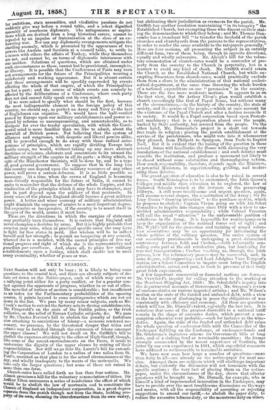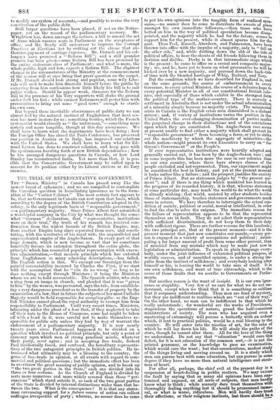NEXT SESSION.
NEXT Session will not only be busy ; it is likely to bring some questions to the crucial test, and there are already subjects of de- bate set down on the Notice-paper, each of which may serve as a rallying point either for a party conflict, or for a popular con- test against the opponents of progress, whether in or out of office. The mere list of notices of motion is considerable ; but insufficient as an index for the Parliamentary probabilities of the opening session, it points beyond to some contingencies which are not set down in the list. We pass by many minor subjects, such as Mr. Crook's motion to extend the factory acts to dyeing establishments, MT. Fitzgerald's on the state of the Dublin police, or the Irish collieries, or the relief of Roman Catholic subjects, &c. We pass by Mr. Charles Forster's bill to abolish the penalty of forfeiture now attaching to convictions of felony—a measure rendered ne- cessary, we presume, by the threatened danger that titles and estates may be forfeited through the extension of felony amongst the upper classes I We will not dwell on Mr. Griffith's bill to abolish the expenses attaching to the office of High Sheriff, though, like some of the recent encroachments on the Peers, it tends to undermine the dignity of the upper classes by cutting off their responsibilities. N-or will we go into Mr. Laurie's bill for extend- ing the Corporation of London to a radius of two miles from St. Paul's, unsuited as that plan is for the actual circumstances of the day, and wholly inadequate to the wants of the metropolis. We take only the larger questions ; but some of these are raised in more than one form.
Church-rates have called forth no less than four notices. Mr. Aloe& promises a bill for the voluntary commutation of tithes. Sir Arthur Elton announces a series of resolutions the effect of which would be to abolish the law of mortmain and to constitute the Church of England an independent corporation, in a great degree separate from the parish though not from the State, holding pro- perty of its own, choosing its churchwardens from its own vestry,
but abdicating their jurisdiction as overseers for the parish. Mr. Griffith has another resolution maintaining " in its integrity" the Established Church, but exempting those who dissent on their stat- ing the denomination to which they belong ; and Mr. Thomas Dun- combe has a trenchant bill " to transfer the freehold of the parish churches and churchyards from the parsons to the representatives, in order to render the same available to the ratepayers generally." Here are four motions, all presenting the subject in an entirely different form, two of them being, though in opposite directions, equally and wholly subversive. Mr. Aleock's bill for the volun- tary commutation of church-rates would be a surrender of pro- perty from the country to the Church in perpetuity, but in a manner to avoid any kind of shock. Mr. Griffith would retain the Church as the Established National Church, but while ex- empting Dissenters from church-rates, would practically exclude them from a share in the administration of that national ecclesi- astical department, at the same time throwing the whole burden of a national expenditure on one " persuasion " in the country. These are the two more moderate motions. It appears to us on the first view, that Sir Arthur Elton's plan would establish a church exceedingly like that of Papal Rome, but without many of the circumstances,—in the history of the country, the state of society, and the genius of the people,—which at once account for the existence of the Papal Church and after a fashion reconcile it to society. It would be a Papal corporation based upon Protest- ant machinery ; that is a corporation placed over the people, backed by State authority, but severed from the people. On the other hand, Mr. Duncombe's project is a short cut towards free trade in religion ; placing the parish establishment at the service of the parishioners, who might vote into it whomsoever they pleased, from Philpott to Spurgeon, from Poole to Baptist Noel. But it is evident that the raising of the question in these several forms will familiarize the House with discussing the very foundations of the national establishment ; and such debates must unsettle the institution, and produce a movement not likely to be closed without some substantive and thoroughgoing reform., How much responsibility, therefore' depends upon the Ministers, or potential Ministers, in superintending, guiding, and moder- ating those debates. The grand question of education is also to be raised in several forms. South Kensington is to be anatomized, the Irish Queen's Colleges and middle class education to be explored, the law of Endowed Schools revised at the instance of the persevering Dillwyn. A still more troublesome and urgent question, again, will assume several shapes, the constitution of the Army ; Sir De Lacy Evans "drawing attention" to the purchase system, which he proposes to abolish ; Captain Vivian going on with his Select Committee to inquire into changes since 1855 with a view to un- divided administrative responsibility ; while Colonel Freest= will call the royal " attention " to the unfavourable position of subalterns in time Army. It is impossible for routincmongers to keep the organization of the national forces out of sight ; and Mr. Wyld'sbill for the promotion and training of armed volun- teer associations may be an opportunity for introducing the whole politics of the military question. The entire system of our secondary punishments is undergoing a great dramatized controversy between Jebb and Crofton,—Jebb reluctantly con- ceding some part of the old retributive plan, but hankering for renewed transportation ; Crofton teaching us, through the Irish prisons, how the reformatory process may be successful, and, in some degree, self-supporting ; and Lord Adolphus Vane Tempest's motion for a Select Committee to inquire must bring the English administration, actual and past, to book in presence of that truly great Irish experiment.
A few important commercial or financial motions are down,— Mr. Crawfurd's inquiry for calling attention to the working of the Merchant Shipping Act, 1853; Mr. Scholefield.'s inquiry into. the departmental accounts of Government ; Mr. Gregson's review- of customs-duties on various imported articles ; and Mr. Wilson's. motion on the state of the funded and unfunded debt, with a view to the best means of discharging in peace the obligations of war consistently with efficiency and economy. All these are questions which will tax Mr. Disraeli's talent, especially the last two. It is notorious that some of the greatest discredits to a national tariff remain in the shape of excessive duties, which prevent a con- sumption otherwise very probable,—such for instance as the wine- duties. Again, the state of the funded and unfunded debt raises the whole question of exchequer-bills with the Chancellor of the Exchequer dabbling on the Exchange, of exchequer-bonds and Mr. Gladstone's ingenious scheme for Government bills at long date, and of a sinking fund or terminable annuities ; the former strongly commended by the recent experience of Sardinia, the latter by our own experiment in 1811, which superficial reasoners have adduced as unfavourable to terminable annuities.
We have now seen how large a number of questions—more than forty in all—are already on the notice-paper for next ses- sion. Amongst them are subjects which will challenge important debate, but evidently the discussion will not terminate with the specific motions ; the very fact of placing them on the notice- paper, under the circumstances of the day, shows that ulterior questions will be brought up. Mr. Disraeli, for example, who is himself a kind of impersonated innovation in the Exchequer, may have to preside over the most troublesome discussions on the ways and means, with all the responsibility of accepting or rejecting suggestions to amend our tariff;—to abolish the paper duty, to reduce the excessive tobacco duty, or the monstrous duty on wines, to modify our system of accounts,—and possibly to revise the very constitution of the public debt.
Still larger questions have been placed, if not on the Notice- paper, yet on the record of the parliamentary memory. Mr. Wrightson has' down amongst the notices, a bill to amend the act of Anne which vacates seats in Parliament on the acceptance of office, and Mr. Brady will endeavour to improve the Corrupt Practices at Elections Act by striking out the clause that au- thorizes payment of carriage expenses. Mr. Disraeli and his col- leagues have promised a "Reform Bill"; and a still grander promise has been given—some Reform Bill has been promised by the entire statesman class of Parliament ; and, what is more, the whole public, high and low, expects a Reform Bill. The slightest change in the circumstances of the Ministry at the commencement of the session will at once bring that great question on the carpet. If Mr. Disraeli should look strong and popular, some wily Libe- rals will seek to make him discredit himself before the public by extorting from him confessions how little likely his bill is to suit public wishes. Should he appear weak, clamours for the Reform Bill in the presence of his Tory supporters will shake the ground under both his feet ; while earnest Reformers will pester him with provocatives to bring out some "good news" enough to startle his own ears.
But beyond these inevitable observances of public duty we can almost feel by the natural instinct of Englishmen that next ses- sion has more in store for us ; something besides, which the French systematist would classify as" the unforeseen,"—something more certain and more tangible, though at this day anonymous. We shall have to learn what the departments have been ; how the Foreign Office has closed the Paris Conference, has preserved. our position in Austria or in Italy, has improved. our relations with the United States. We shall have to learn what Sir Ed- ward Lytton has done to construct colonies and keep pace with the spontaneous bursting forth of new British dependencies ; how he has assuaged dangerous questions in Canada, or how Lord Stanley has reconstructed India. Yet more than that, it is pos- sible that the Conservative Government may be called. upon to account for its position either by its Liberal enviers or its Tory enemies.



























 Previous page
Previous page